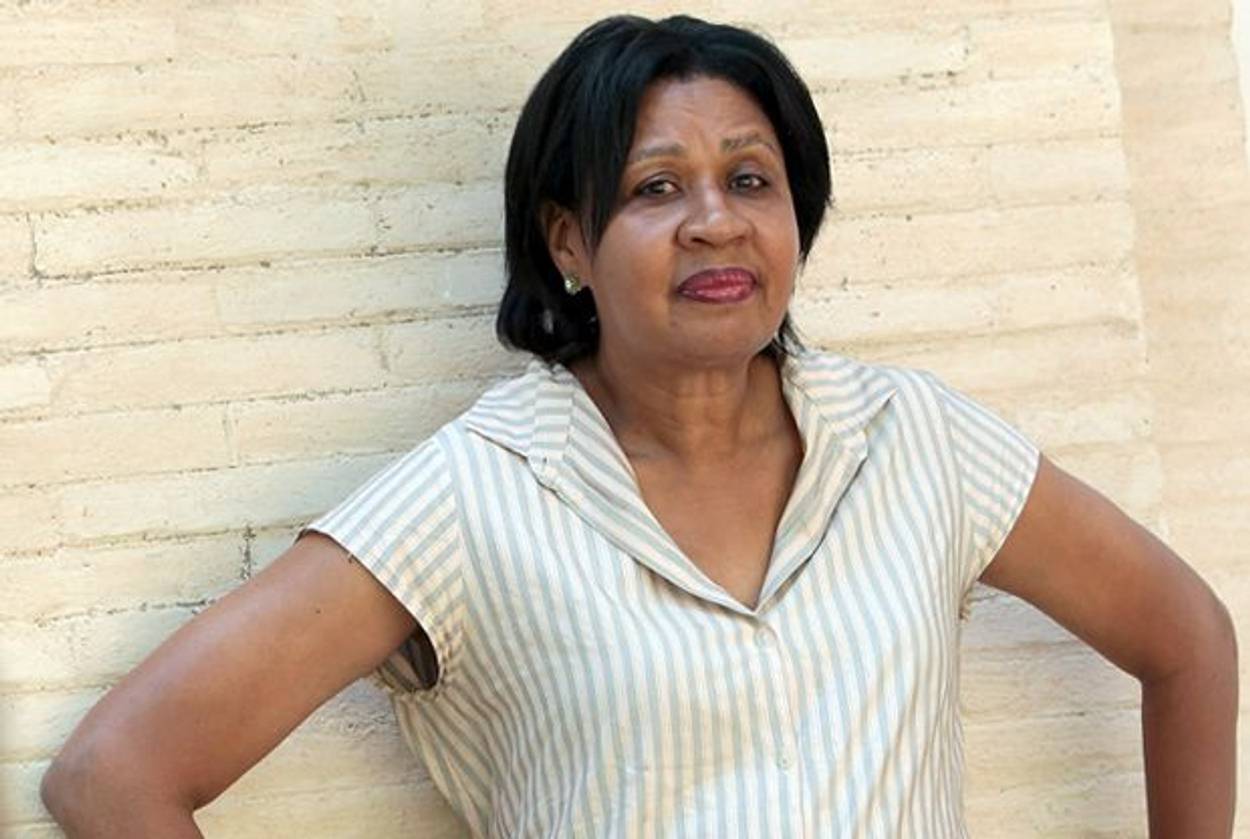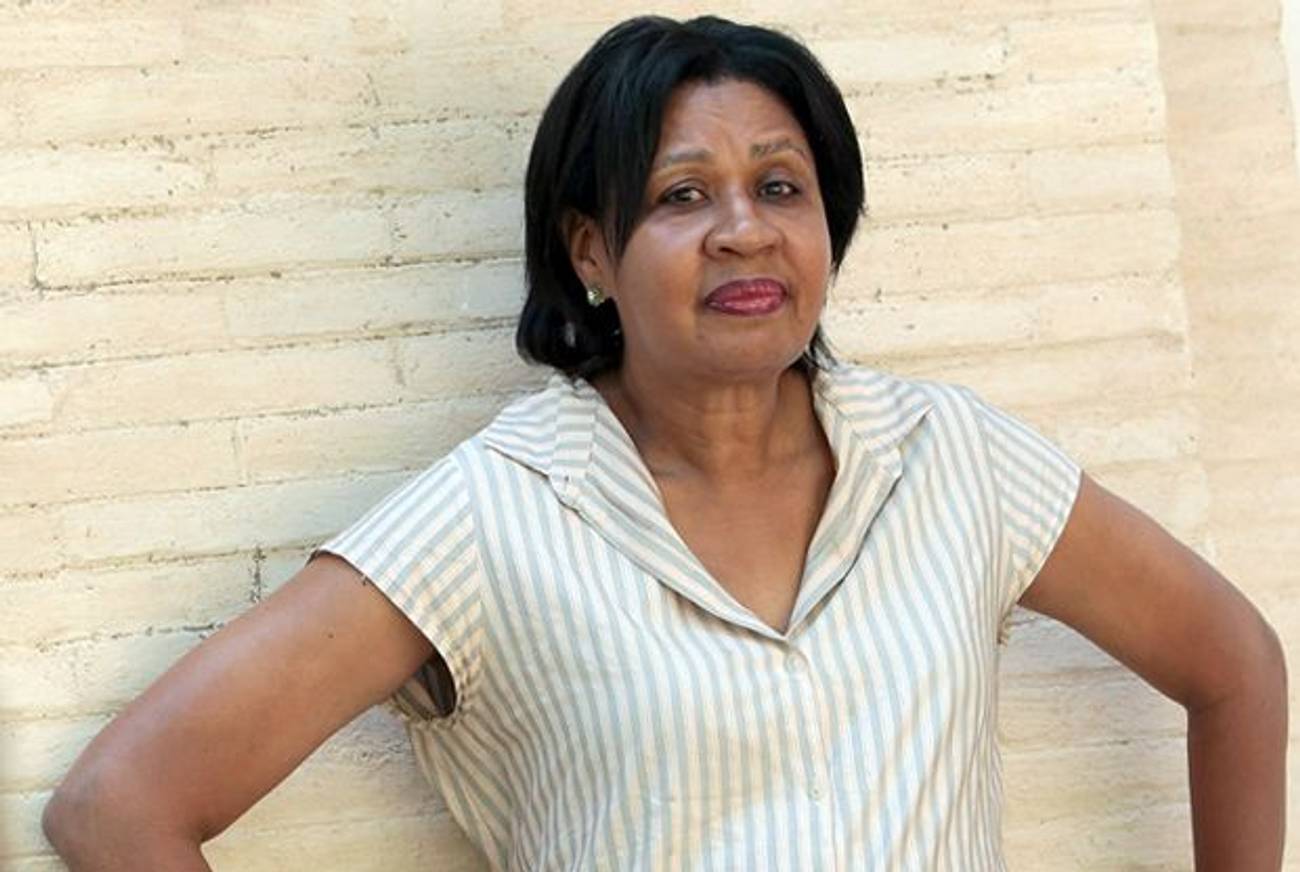Jamaica Kincaid Is Still Jewish
The author, publishing a new novel this week, talks about conversion, suffering, and life in Vermont




“I need socks,” Jamaica Kincaid said, standing in the doorway of her clapboard Vermont home, barefoot and clutching her laptop. She went upstairs to fetch a pair and asked that I wait in her living room, which was cluttered in a cozy way, the walls filled with books and every surface covered with tchotchkes—menorahs and tropical-colored paintings and miniature brass sculptures. It was the kind of room that would make it difficult to leave the house. Beside the couch was a tall table with an array of crudely made ceramic artifacts—a pizza, a duck, and more than a dozen uneven baskets, as if a summer-camp bunk was waiting for their creations to dry.
Kincaid returned, still barefoot, but with a pair of Smart-Wool socks in hand. She wore black stretch pants and a pinto-bean-colored headscarf. “I was up all night long, working on a sentence,” she said. She hadn’t finished it yet.
Kincaid, a novelist and a former writer for The New Yorker, recently finished her first novel in 10 years, See Now Then, out this week. Kincaid bristles at the notion, implicit in the way the book is being marketed, that 10 years is an unusually long time to wait between books. She does not write every day and dislikes the notion of committing to a novel as one does a job. The desk in her office is strewn with papers in a manner suggesting that she doesn’t spend very much time there. “If I had a book every year, I would keep it to myself,” she said. She says she still marvels at the fact that she’s a published author. When she moved to New York from Antigua in 1965 to work as an au pair for a family on Madison Avenue, she never expected to be able to publish a book, and certainly not 13 of them. “It’s harder now for an unconnected black woman like I was,” Kincaid said. She famously got her first assignment, for Ingenue magazine, by walking into their office from off the street and pitching an interview with Gloria Steinem. That opened the door to pieces for The New Yorker and The Village Voice and the parties and readings of New York’s literary scene, of which Kincaid was a fixture. It’s a time she remembers fondly, and hasn’t fully abandoned.
See Now Then is about the failing marriage between a writer and a composer living in a small New England village. The writer, Mrs. Sweet, is black and from the Caribbean, and her husband, Mr. Sweet, is white and comes from a princely faction of New York “entitled to doormen, no matter what.” The book’s premise appears to be borrowed from Kincaid’s own life: In 2002, her 20-year marriage to the composer Allen Shawn ended in divorce. Kincaid continues to live in the Bennington home they shared.
There are other, obvious overlaps between Kincaid’s life and that of her characters: The Sweets, like Shawn and Kincaid, have two children, a son and a daughter. Mrs. Sweet is quite tall, while her husband is described as being “a size of a mole.” Kincaid is over 6 feet tall and Allen Shawn, whose father, William Shawn, was Kincaid’s boss at The New Yorker, has been likened to a hobbit. Kincaid, however, is offended by the notion that her fiction is autobiographical. “It’s belittling to think that what I’ve done hinges so much on my own life. It’s as if the reality of what I’ve written is hard to take in so that people must ask about my life rather than what I’ve written,” Kincaid said. “The purpose of the novel wasn’t to talk about the intimate details of my life. The biggest character in the book is the thing we call time: What connects you to tomorrow.”
Kincaid said she knows a little more about time after having written See Now Then than she did before. She finds time to be a fascinating, if not an especially inviting subject. “I realized that while I am not indifferent to time, time is completely indifferent to me,” she told me. There is much musing on the topic of time in See Now Then, in the long, rhythmic sentences for which Kincaid is best known, sentences that, in their carefree momentum, almost embody the passage of time: “Right now is always so incomplete, or so we feel, and that is a blessing, for it transforms then into what will come, all that will come, even though all that will come must contain right now and the unfathomable longing for the then,” she writes near the end of the book. She believes that men and women experience time differently. She thinks men seek to escape time and dart around the world hoping to avoid its passage. Men, she told me, “live in Greece and then at 33 they go to Afghanistan having conquered all the space between Greece and Afghanistan and then they die.” She smiled, revealing her braces. With women, Kincaid said, “time is a cause of suffering, but a suffering from which they don’t want any relief.”
Kincaid is resistant to chance. She despises ambiguity—she says she doesn’t believe in forgiveness and that when she makes a promise, she always keeps it. She was taken aback when people asked, following her divorce, if she planned to renounce her Jewish faith. Raised as a Wesleyan Methodist, she converted to Judaism in 1993. “People ask me if I’m still a Jew and it’s like, do you think Judaism is a fashionable skirt?” Kincaid started accompanying her children to synagogue when they were young. Although Shawn was Jewish, he refused to attend temple, having never attended when he was growing up, and Kincaid didn’t want her children to lose sight of their heritage. She decided to convert, she said, after “a rabbi told us that we couldn’t all be buried in the same cemetery. And I thought, ‘what if there’s a Jewish heaven and I’m in the other heaven and I’d have to send them letters?’ I couldn’t bear to be separated from them.” In the 1990s, when her children were growing up, she was president of Bennington’s synagogue, Congregation Beth El.
Like Mrs. Sweet, Kincaid is happy to be ensconced in Vermont. (“I like being a hippy.”) New York has lost its allure. (“Everyone there is so desperately young.”) Also like her character, Kincaid is devoted to domestic life and enjoys the fact that life in Vermont affords her plenty of time to garden, a hobby she writes about frequently, and to perfect her macaroni-and-cheese recipe, which she feels she has finally mastered. She wouldn’t tell me what the tricky sentence was about. “If I could just speak about it, why would I write it down?” she said. “I write what I can’t understand.
Jessica Weisberg is a writer and editor in New York. Her Twitter feed is @jessicaweisberg.